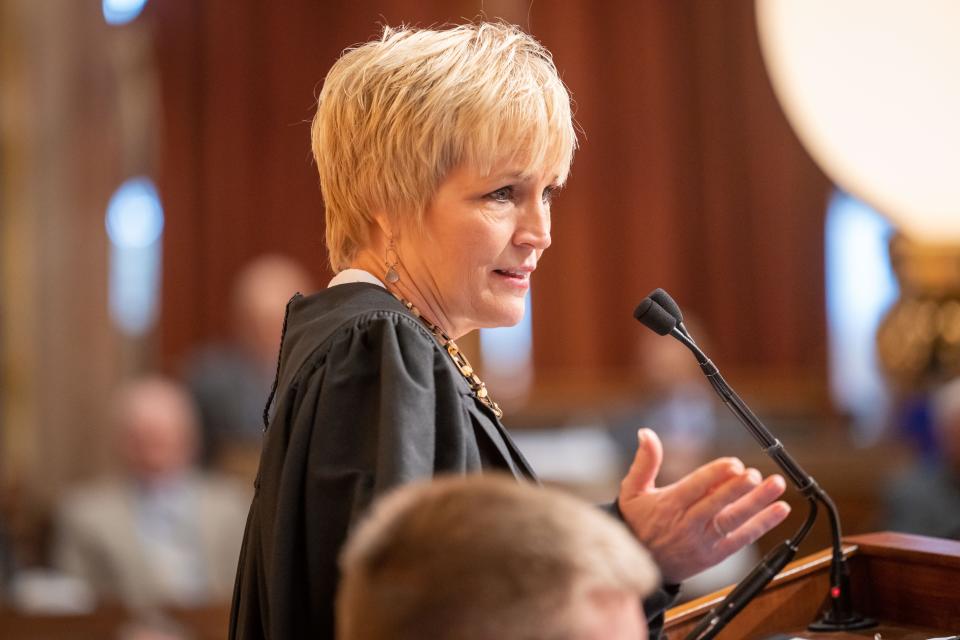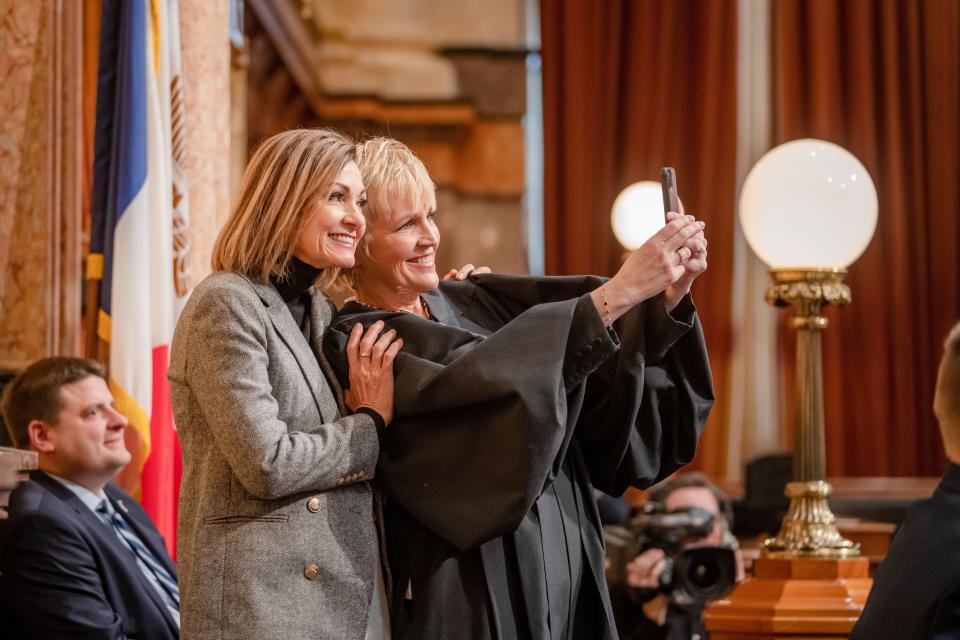Iowa's chief justice warns state's indigent defense system could collapse
- Oops!Something went wrong.Please try again later.
Iowa's most senior judicial officer warned Wednesday that the state's system for defending impoverished criminal defendants and juvenile court clients is on the brink of collapse.
Iowa Supreme Court Chief Justice Susan Christensen, in her annual Condition of the Judiciary address, said Iowa is facing a critical shortage of contract attorneys willing to accept cases representing indigent clients. The growing shortage has resulted in delays for criminal defendants, child in need of assistance cases and other court proceedings.
It also means pressure on the remaining contract attorneys, who face larger caseloads and, in some cases, grueling travel as they juggle cases in multiple counties.
"Our federal and state constitutional obligation to provide indigent counsel is on the verge of snapping. Attorneys, judges and court administration are scrambling to try and cover bases," Christensen told a joint session of the Legislature as she urged legislators to raise contract attorneys' pay. "Something has to give."

'This is a crisis,' chief justice says
Iowa provides indigent legal representation in two ways: with public defenders employed directly by the state, and with other private attorneys who agree to take cases from the public defender's office on a contract basis. It's in the latter category that Iowa faces a growing shortfall, Christensen said. According to the Iowa Bar Association and State Public Defender Jeff Wright, the number of contract defense attorneys statewide has dwindled to 564, from 1,100 in 2014.
The issue is related to a larger shortage of practicing lawyers in many parts of the state, Christensen said. In her native Shelby County, she said, the number of practicing attorneys has declined by half over the past two decades. Of the 11 attorneys still practicing in Shelby County, seven are judges or prosecutors. That means that only four attorneys are even eligible to accept contract work — too few for a county that brings an average of 225 new criminal case filings a year.
"And Shelby County is by no means unique," Christensen said. "This is a crisis in nearly every rural and urban county in our state."
More:Kim Reynolds proposes private school scholarships for every Iowa family in Condition of the State
In one case, Christensen said, a defendant was assigned five different attorneys over a three-month span as several in succession quit taking contract work. In another, an attorney representing two serious felony defendants and a parent facing termination of parental rights in three different counties had to drive hundreds of miles to appear in person for hearings in all three cases in a single day.
To lessen the pressure, Christensen said, the judicial branch is encouraging judges to hold remote hearings where possible and adapt their schedules to accommodate attorneys' calendars. But she also told the Legislature more help is needed, and urged legislators to increase funding for indigent defense, separate from the 4% funding increase the judicial branch is seeking for its own operations in the next fiscal year.
Iowa pays between $68 and $78 per hour for contract attorneys representing indigent clients, and does not reimburse for travel expenses. That rate, which is set by the Legislature, is far less than attorneys earn doing similar contract work in federal courts, which pay $158 per hour in Iowa, or in some of Iowa's neighboring states. In Nebraska, for example, the vast majority of courts pay $95 or $100 per hour for contract defense work, according to that state's bar association.
From 2021:Iowa Chief Justice: Court system 'turned on its head' but 'did not succumb' to pandemic
Official: Indigent defense 'honorable,' but grueling, work
Wright, the state public defender, oversees indigent defense across the state and said the problem has been growing for years. In 2021, the office hired 10 new public defenders specifically to serve rural areas of the state. That doesn't make up for the loss, over the past decade, of literally hundreds of contract attorneys handling indigent cases part-time.
The problem, Wright told the Register, goes beyond the pay rate, which has seen several small increases since 2019. Contract defense work is a difficult and thankless job, he said, with practitioners caught between clients, prosecutors and judges and often faced with skepticism or outright hostility from the public over their representation of clients accused of unsavory crimes.
"It is very difficult for the attorneys who do that work on a daily basis to continue to do it, and it is really, really honorable work that's actually provided for in the Constitution," he said.
Case numbers needing indigent defense attorneys have remained fairly stable in recent years, Wright said, but the number of attorneys available for those cases has declined.
To address the problem, Wright said, the governor's budget will include a request to increase the pay rate for contract attorneys, although the exact number has not been announced. Wright's office has also worked to provide better administrative service for contract attorneys, including faster payment of claims and free legal education programs, and is working to recruit more attorneys around the state and from new law school graduates, he said.
Rep. Brian Lohse, R-Bondurant, said after Christensen's speech that the legislature is looking into the issue. An attorney and chair of the House Justice Systems Appropriations subcommittee, Lohse said in an interview his goal, over the next four years, is to increase contract attorney pay by $32 across the board, to at least $100 per hour, and to implement some form of travel reimbursement.
"I know, personally, that there's a real desert, for lack of a better term, of attorneys in Iowa, especially in rural Iowa," he said. "So if we want to bolster that in rural Iowa, we have to get this up to a rate where it covers the overhead at the minimum."
Also wanted: More court reporters
In her address Wednesday, Christensen touched on a number of other issues facing the judiciary.
In addition to contract attorneys, courts are struggling with a shortage of certified court reporters, who produce legal transcripts of trials and hearings, Christensen said. She also raised alarm about substance abuse and mental health struggles among attorneys, who report drinking problems and similar issues at a rate well above the general population.

She described her findings from several listening sessions around the state she held in recent months with Iowa Health and Human Services Director Kelly Garcia, including ideas for improved coordination between the two branches in cases involving at-risk families. Christensen also previewed the findings of a year-long juvenile justice task force review, which resulted in dozens of recommendations that she said will be released later this month. And she said the judicial branch will continue looking for ways to solicit input from the legal community and broader public.
"In the legal profession, it has been said that justice cannot exist without listening. That makes perfect sense," Christensen said. "How can we provide litigants an opportunity to be heard if we are not listening to what is being said?"
William Morris covers courts for the Des Moines Register. He can be contacted at wrmorris2@registermedia.com, 715-573-8166 or on Twitter at @DMRMorris.
This article originally appeared on Des Moines Register: Iowa indigent defense system in 'crisis': Supreme Court chief justice

